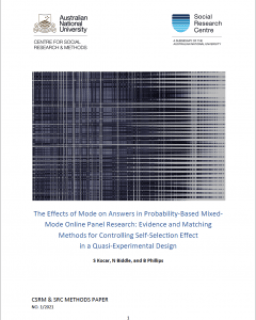
Abstract
Online probability-based panels often apply two or more data collection modes to cover both online and offline populations. They do so with the aim of obtaining results that are more representative of the population of interest, in most cases the general population, than Web mode only. This study investigates mode effects in two different surveys – a probability-based quasi-experimental web-push survey and a probability-based online panel study. For both surveys the same questionnaire including items with nationally representative benchmarks was used. The aim of this study is to identify differences in answers in three different modes, the online and two offline (mail and telephone) modes, to establish the degree of measurement errors due to mixing modes and to present evidence about the most suitable combination of online-offline modes in online panel research from a measurement error perspective.
File attachments
| Attachment | Size |
|---|---|
| The_Effects_of_Mode_on_Answers.pdf(1.58 MB) | 1.58 MB |